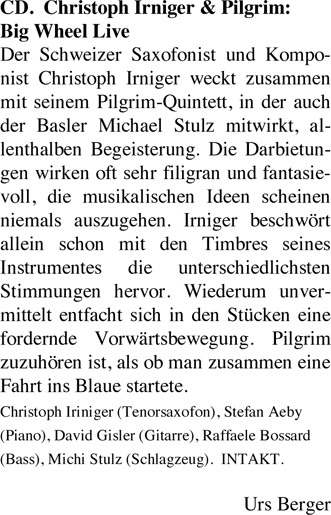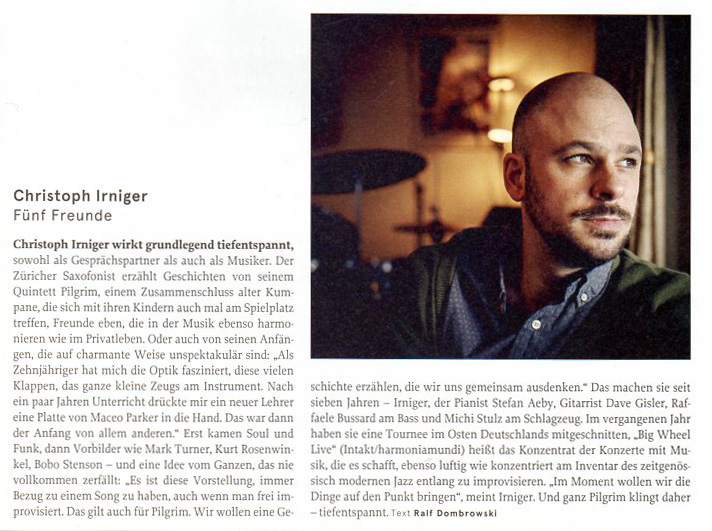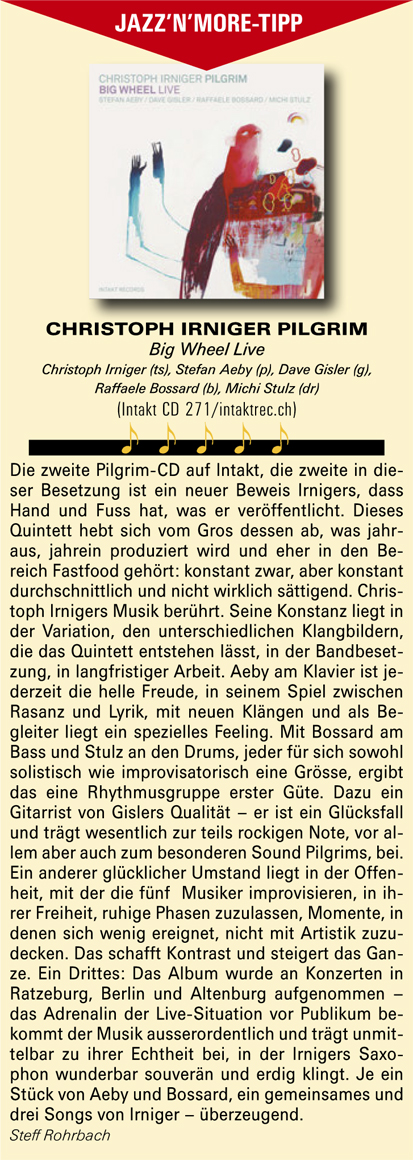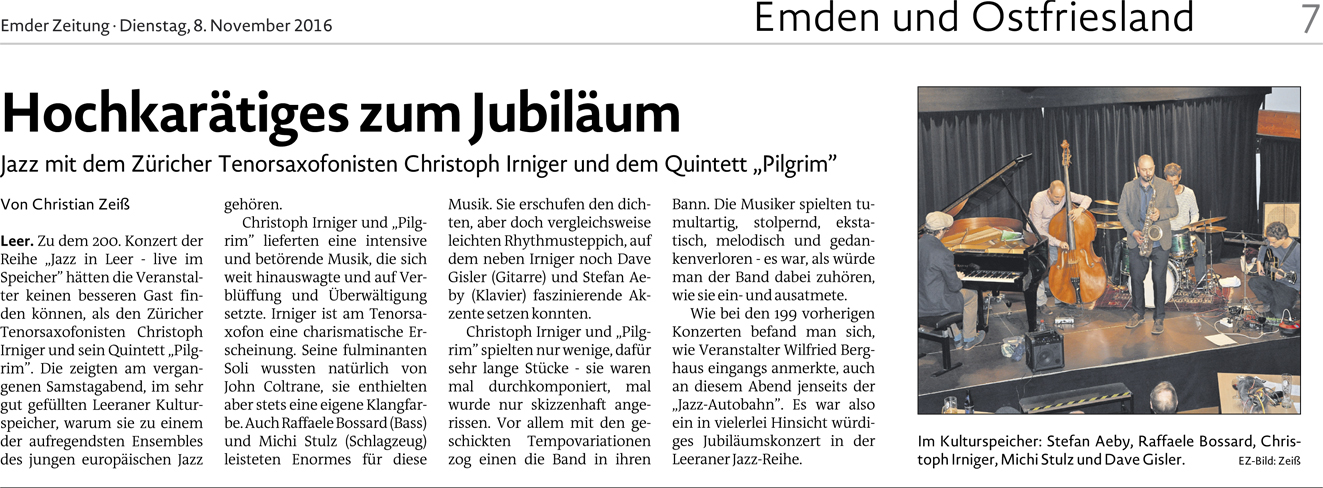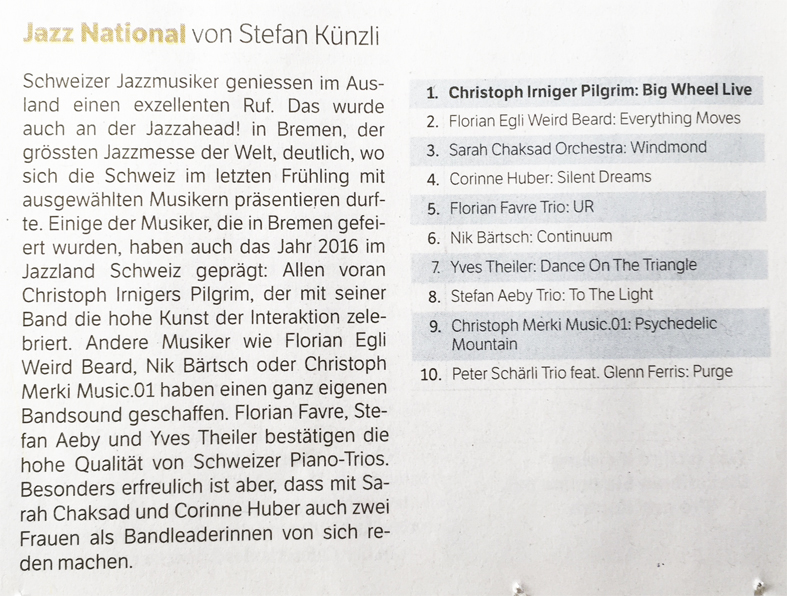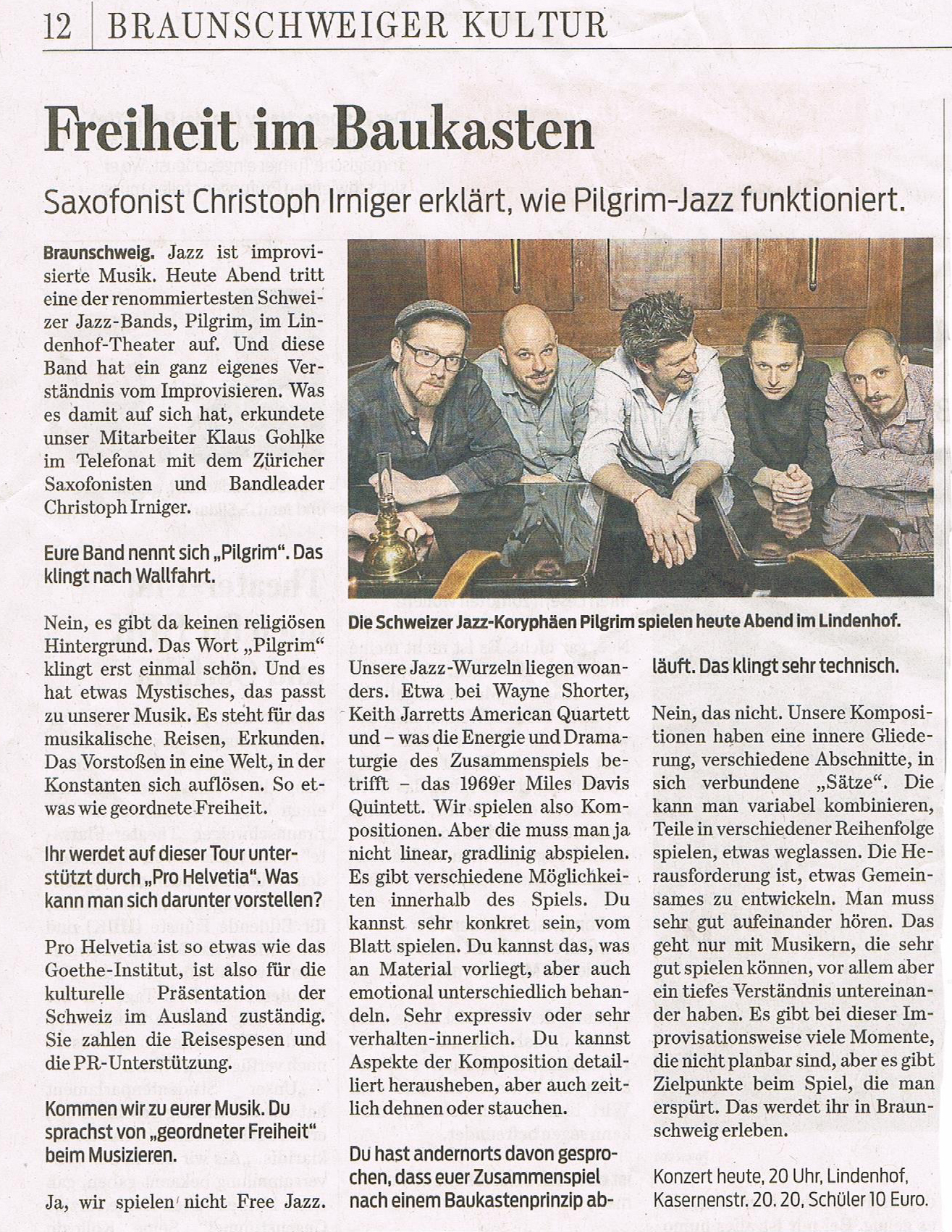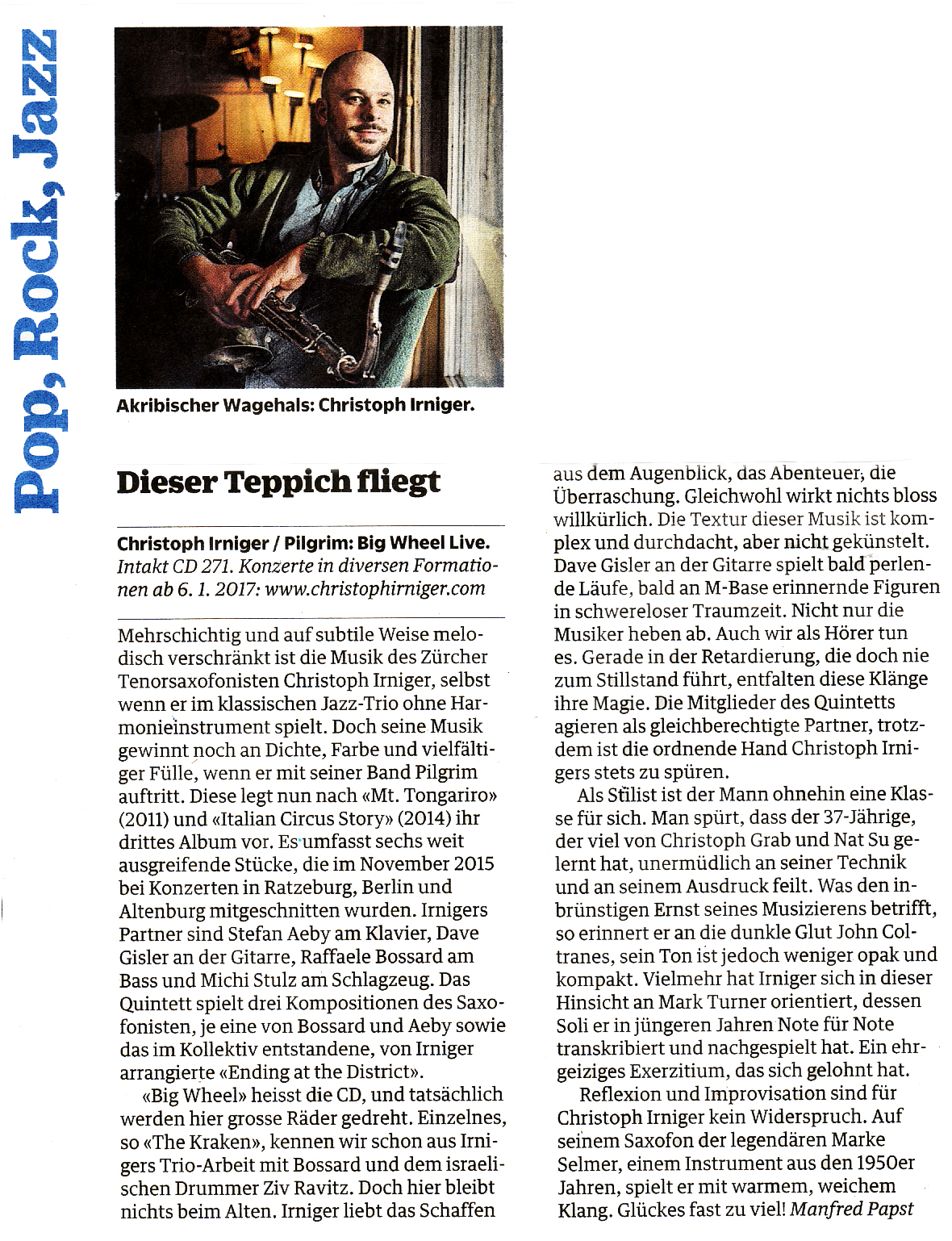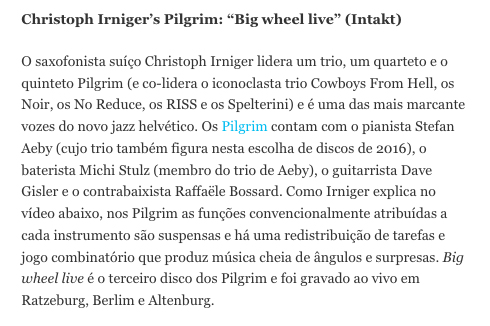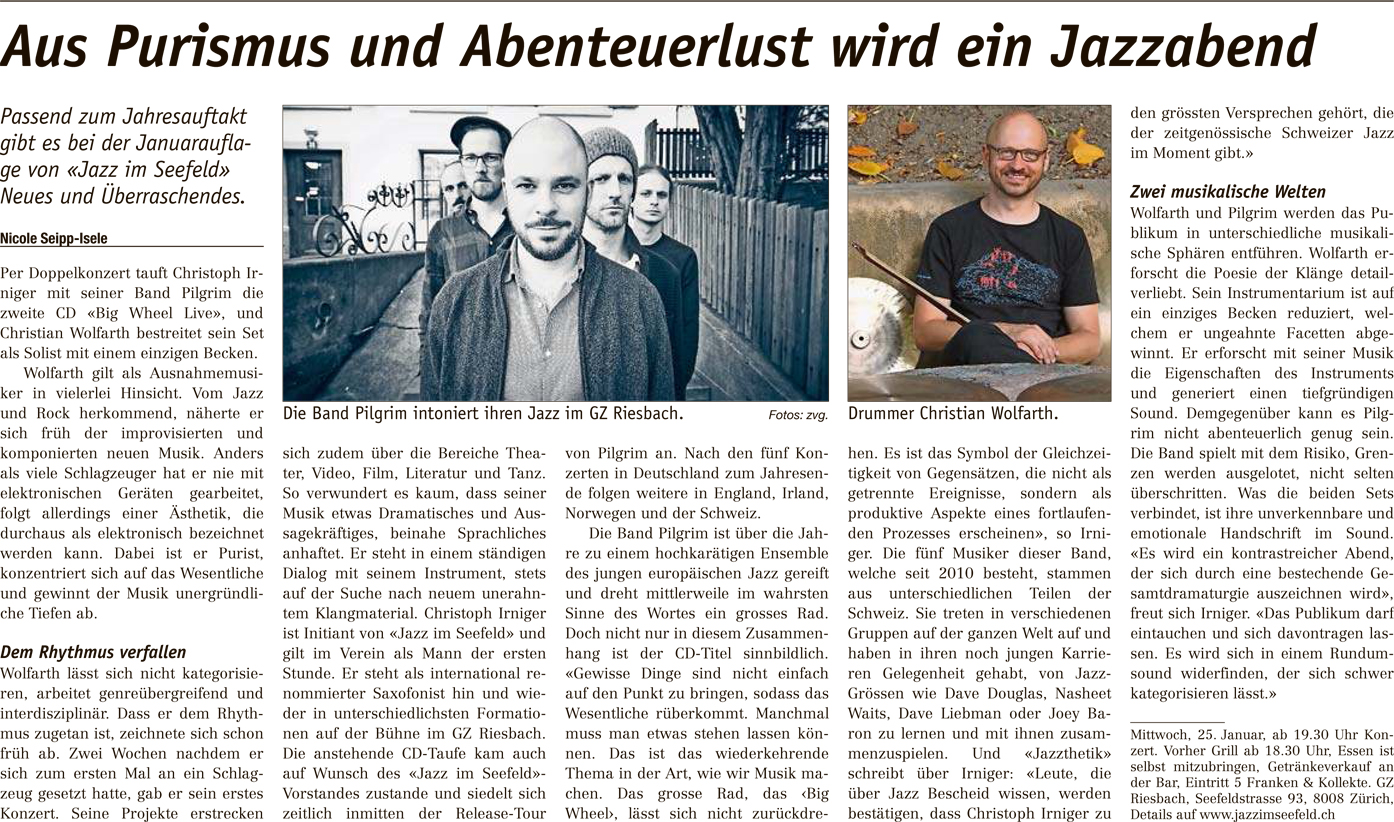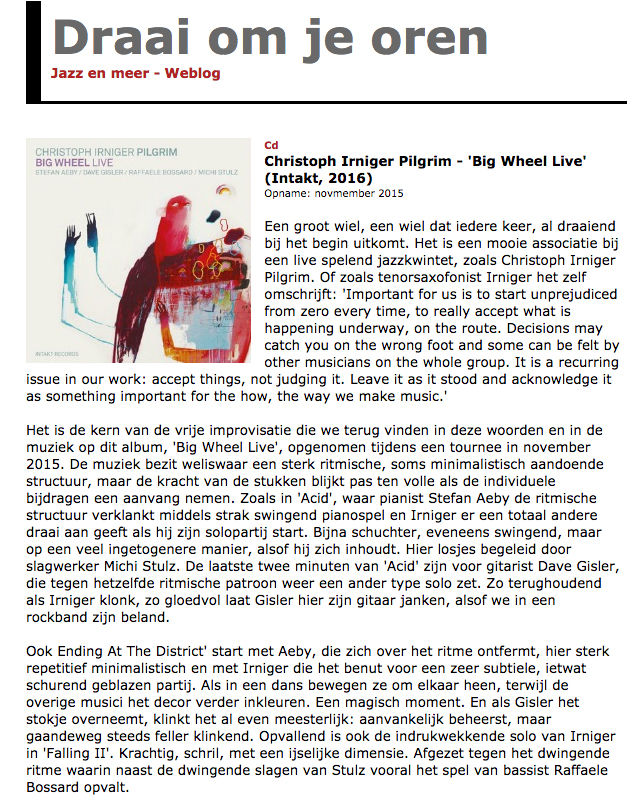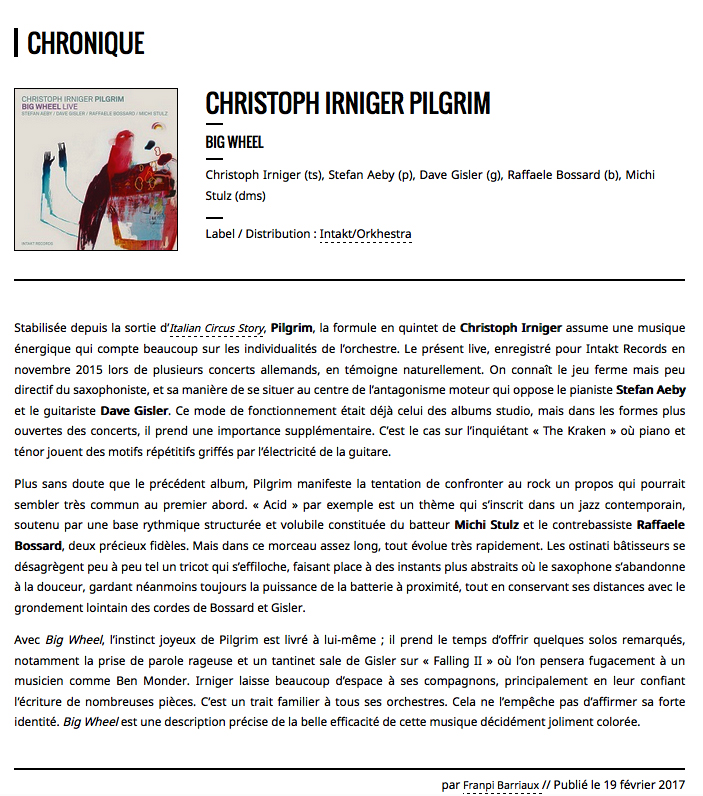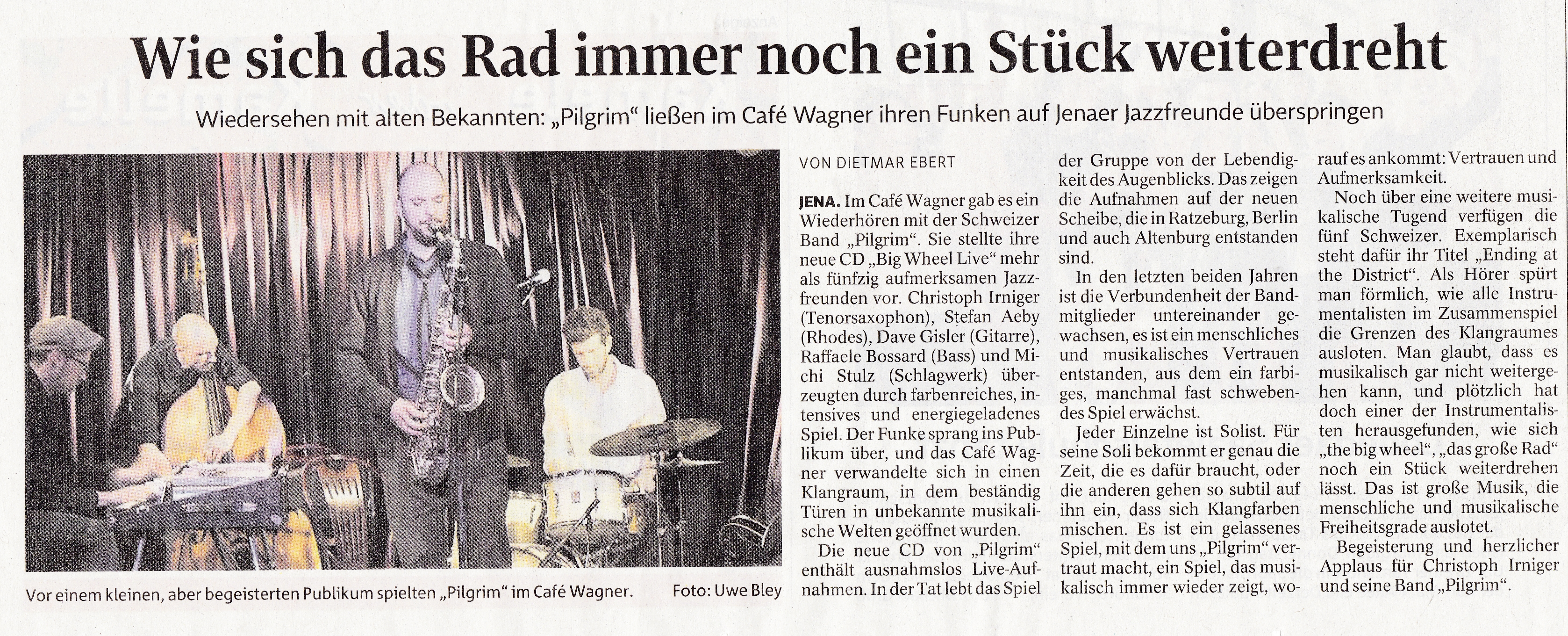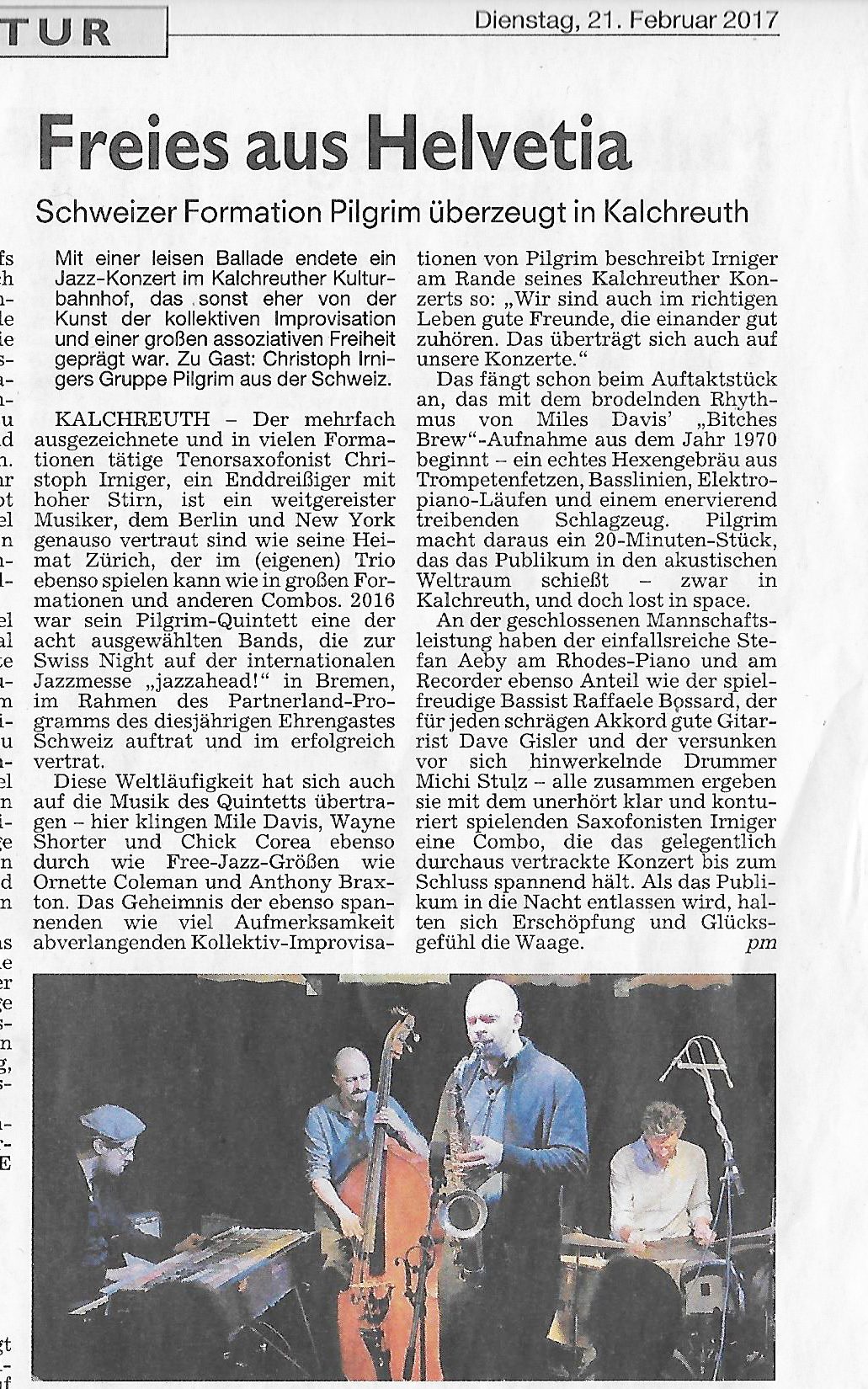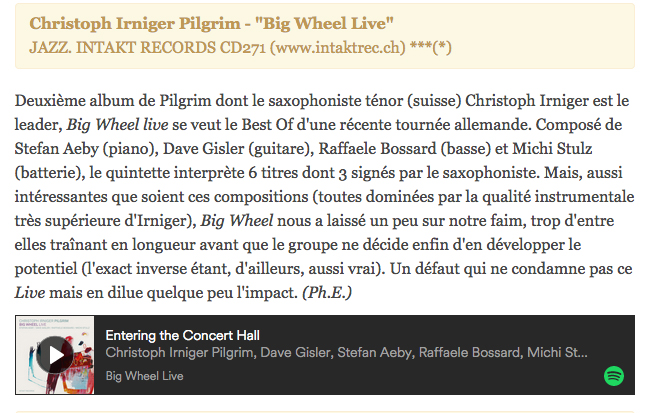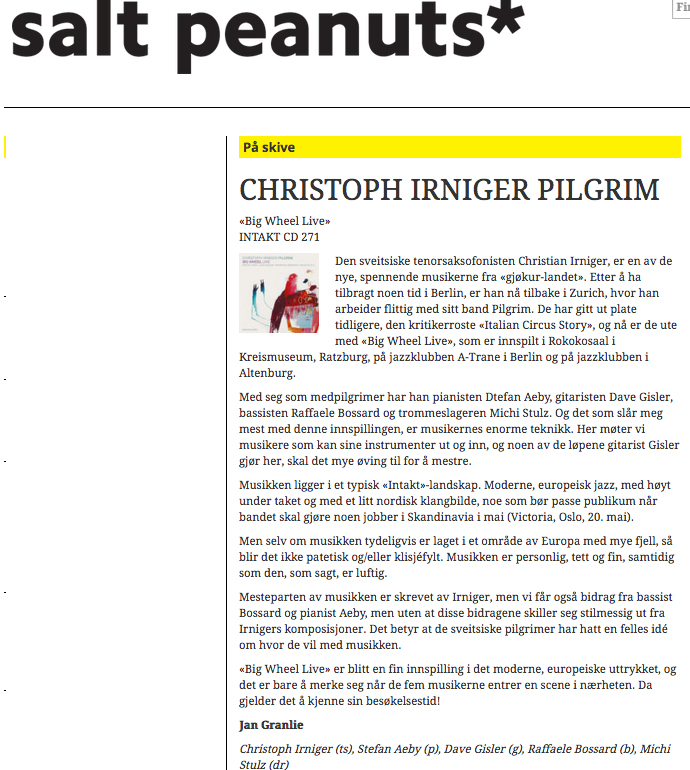INTAKT
RECORDS –
CD-REVIEWS
CHRISTOPH IRNIGER PILGRIM
BIG WHEEL LIVE
Intakt CD 271 / 2016
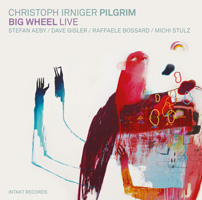
Eigentlich wäre CHRISTOPH IRNIGER PILGRIM schon mal eine Freakshow-Alternative zu
Featuring Christoph Irniger on tenor sax, Dave Gisler on guitar, Stefan Aeby on
Urs Berger, Biel-Benkemer Dorf-Zytig, September 2016
bak, Concerto, Österreich, Oktober 2016
Here's a young European jazz outfit that has a distinct personality. Led by Swiss tenor saxophonist Christoph Irniger, the quintet's upfront deportment is consummated by interweaving progressions and climactic pieces riding above variable currents. One of many outwardly enticing attributes is how sublime choruses often feel like they are on the verge of exploding into impacting sojourns, even when they don't. Irniger and top-flight guitarist Dave Gisler are strong foils and are undoubtedly a near-flawless match, here, on the quintet's debut live recording. Most of these works offer harmonious primary themes, regardless of tempo or when the band is tearing It up. Marked by expanding improvisational components and converging opuses, Irniger's corpulent sound and Gisler's scathing, distortion tinted lines often bridge flourishing upsurges with airy and uncluttered movements, augmented by the rhythm section's punchy accents. "Acid" is framed on a staggered cadence, colorfully navigated by the leader's delicate and tuneful phrasings that evolve into ominous and brooding passages, where Gisler seemingly bores a passageway into the netherworld with crunching and resonating lines. Irniger and Gisler's chunky notes on "Falling II" tenders an avant, jazz fusion paradigm, leading to ethereal contrasts amid a winding and edgy mode of attack, as the musicians' paint a dark, yet evocative storyline of perhaps searching for hidden treasures along the way. However, the plot thickens on the aptly titled "Lost in Space," via pianist Stefan Aeby's opening intro that summons an ECM Records type esthetic, tinted with a quiet and mystical tone poem vibe. Ultimately, Irniger's latest offering has great replay value due to its magnetic appeal, where various jazz-laced inferences translucently morph into an enticing program that draws you deeper and deeper into its core on repeated spins. Glenn Astarita, www.allaboutjazz.com, October 17, 2016, USA
A saxophone figure leaps forward with a texture resembling something like the marriage between a bongo and a plucked string instrument. It eases into its more traditional nature as a saxophone as the head of the song emerges. With the drums, bass, and piano flowing in and around each other like sonic arabesques, the saxophone played with Coltrane inspired melodies fitted into a very different aspect of jazz. The piano made its statement, while changing the direction the music went. The bass brought its say to the floor, and the guitar stepped forward and precipitated itself like raindrops in a gentle breeze before morphing into a series of distorted and processed textures that one rarely associates with jazz. This was “Entering the Concert Hall,” the opening track of The Big Wheel, the new release by Christoph Irniger’s ensemble Pilgrim. Pilgrim is Christoph Irniger (saxophone), Stefan Aeby (piano), Dave Gisler (guitar), Raffaele Bossard (bass), and Michi Stulz (drums). The Zurich based quintet’s newest release shows a very iconoclastic approach to the concept of individuality in jazz. Make no mistake; this is jazz. There’s nothing here that could be called “crossover” or would be difficult to categorize as anything but jazz. But they clearly take the idea of individuality and expression in the moment very seriously. The music was recorded live; and there is an honesty and immediacy about the music. Irniger’s approach to tenor sax is clearly a branch of the tree rooted in the Coltrane tradition. Yet he has a softer, more deliberate approach to the instrument, with little of the frenzied abandon that many saxophonists take. This is not to say he plays with no passion; it’s more to the point that his passion and the message of his music are more understated and subtle. He clearly feels no need to hit anyone over the head with his musical ideas. Aeby approaches the piano from a similar mindset, yet an undercurrent of humor is obvious throughout. Gisler and Stulz are the adventurous ones in this ensemble. Their presence provides a fascinating counterpoint to Irniger and Aeby. Gisler’s guitar playing throws shades of color into the music that both contrasts and blends with what’s happening in the unfolding of the compositions that work well, but are impossible to predict. Stulz’ drumming is fascinating; he knows how to drive the rhythm and at the same time provide ornamentation to what everyone else is doing. Bossard is a fine bass player, who understands how to provide an ever changing foundation and axis (I dislike the term “anchor” for bassists) that unifies the band. The CD provides a nice variety of very different kinds of compositions that nonetheless hang very well together. “Acid” takes the listener into a strange and almost soundscape that lives up to its name (Gisele’s guitar work provided excellent evidence of this). “Ending at the District” is an abstract impressionistic piece that moves through inventive and colorful harmonies with a dreamy liquidity. The oppositions and improvisations that grow from them make very interesting use of space and texture. These guys are not interested in ostentatious displays of technical mastery: their music is more like walking through an art gallery and experiencing an ever changing manifestation of the artist’s view of the world from an outer and inner perspective. I must close with a personal anecdote. I was performing with my ensemble in a club in Lower Manhattan some years ago. A friend’s band followed. In the middle of their set, the band that was scheduled to follow them arrived. I spoke to that band’s saxophonist, an elder African American gentleman. He listened to the band that was on stage and commented that he was happy that the younger generation of white jazz musicians are not trying to play like black people. It was an interesting comment. The uncomfortable questions of race relations (and the very idea of race being an artificial political construct that has infected the modern zeitgeist), aside, his comment stated how open to possibility jazz is, and at the same time acknowledged that everyone has something to contribute. Pilgrim is the kind of band that demonstrates this well. In the tradition begun by Django Reinhardt, they came to the jazz table with something different. They brought themselves and their own traditions and cultural heritage, rather than an imitation of what had been before them. And jazz itself welcomed them, and offered fertile ground for them to grow as artists. Their music could not have come from the US: the music speaks of who they are and where they come from. Dawoud Kringle, www.doobeedoobeedoo.info, October 15, 2016, USA
Jean Buzelin. Disques, livres & Co » Chroniques 2016. 14 Octobre 2016.
Ralf Dombrowski, Jazzthing, Herbst 2016, Deutschland
Ein weitschweifiges, gern auch recht medidative Linien schreibendes Tenorsaxofon (Christoph Irninger), eine virtuose Gitarre (Dave Gisler), ein intelligent fokussierendes Piano (Stefan Aeby), ein intelligent elastisch agierender Bass (Raffaele Bossard), ein fein verästelndes Schlagzeug mit Vorliebe für Winkel und Ecken (Michi Stulz) – das ist Christoph Irninger Pilgrim, eine Formation, die überaus interssanten zeitgenössischen Jazz zu bieten hat. Big Wheel Live ist eine Zusammenstellung von Mitschnitten aus dem letzten Jahr. Die Musiker präsentieren sich als bestens kommunizierende Einheit, die eine Musik von hoher Originalität zu Gehör bringt. Es wird aufeinander losgespielt, ohne miteinander zu kollidieren oder einander im Weg zu sein. Vielmehr legt man darauf Wert, sich gegenseitig zu komplementieren und den Schwenks der anderen zu folgen. Dies geschieht auf Basis eines - wie sagen es die liner notes treffend – „modalen Baukastensystems“, dessen Elemente miteinander verschiedenartig kombiniert und ineinader verschachtelt werden. Ein äußerst lebendig dahinblubberndes, veilschichtiges Gebräu aus sich delikat ineinander verzahnenden und wieder auseinander strebenden Teilen, das unweigerlich in seinen Bann zu ziehen vermag. Man pilgert individuell und doch gemeinsam umher, verarbeitet auch Minimalistisches mit Ausladenderem, folgt eigenen Wegen, ohne sich aus den Ohren zu verlieren. This is simply excellent stuff!
Christian Zeiss, Emder Zeitung, 8. Nov. 2016
Pirmin Bossart, Kulturtipp, Schweiz, November 2016
Stefan Künzli, Beste CD 2016, Aargauer Zeitung, Dezember 2016
Emder Zeitung, November 2016
Klaus Gohlke, Klagoblueblog, Deutschland, 28.11.16
Craig Premo, Improvisedblog, Best CDs of 2016, USA, December 16
Matthias Mader, www.matthias-mader.de, Deutschland, 19.12.16
Manfred Papst, NZZ am Sonntag, 25. Dezember 2016
José Carlos Fernandes, melhores-discos-de-2016, Oservador, Portugal, 25. Dez. 2016
Rolf Thomas, Jazzthetik, Januar 2017
Nicole Seipp-Isele, Züribergzeitung, 21. Januar 2017
Christoph Merki, Tages-Anzeiger, 25. Januar 2017
Ben Taffijn, Jazz en meer, 5.2.17
Philippe De Cleen, Written in Music, 24. Februari 2017
Dietmar Ebert, Erlanger Nachrichten, Feb 2017
pm, Thüringische Landeszeitung 21.2. 2017
Rainer Guérich, inMusic, 2017
Jan Ganlie, salt peanuts, 26. mars 2017
Ayumi Kagitani, Way Out West 97, Japan, April 2017
The highlight of this brilliant disc, Christophe Irniger’s doffing of the proverbial hat to Mussorgsky’s “Pictures an an Exhibition”, is the deliriously surreal “Acid” written for Pilgrim, which includes Irniger on tenor saxophone, Stefan Aeby on piano, Dave Gisler on guitar, Raffaele Bossard on bass and Michi Stulz on drums. The 12-minute, 41-second-long song is played with intoxicating style by the quintet live in concert at Ratzeburg, Berlin and Altenburg which was captured on record by Hannes Kumke. The rest of the music on these three sets is equally wonderful with its edgy, retro urban energy. “The Kraken”, another Irniger composition is equally brilliant and virtuoso to the end, as is Raffaele Bossard’s “Falling II”. Each of these epic pieces shows off each instrument, alone and in stunning combinations with the others. Christophe Irniger’s command of pitch and line against the piano and guitar is most compelling. Raul da Gama (from "The Intakt Adventure Continues"), jazzdagama.com, May 1, 2017
Formacja Pilgrim, ciągle zaliczanego do młodego pokolenia, szwajcarskiego saksofonisty Christopha Irnigera istnieje nieprzerwanie mniej więcej od 2010 roku. Kilka miesięcy po oficjalnym założeniu zespołu istniejącego do dziś w niezmienionym składzie na rynku ukazał się jego pierwszy album – „Mt. Tongariro”. „Big Wheel Live” jest pierwszym koncertowym nagraniem kwintetu, a trzecim w dyskografii zespołu. Wydaje się, że to niewiele dla zespołu działającego już niemal 7 lat, jednak jego członkowie uczestniczą równolegle w wielu innych formacjach i nagrywają swoje autorskie albumy. 3 albumy w 7 lat nie oznaczają więc twórczej niemocy, a raczej napięty harmonogram nagraniowy uzupełniony całkiem pokaźnym kalendarzem koncertowym. Zespół dojrzewa i nagranie albumu koncertowego jest doskonałą okazją, żeby to pokazać fanom, którzy nie mogą zobaczyć zespołu na scenie i dać doskonałą pamiątkę tym, którzy koncerty widzieli. Zespół uznawany jest powszechnie za jedną z najbardziej obiecujących młodych europejskich formacji, choć ja osobiście uważam, że jest ich więcej niż kilka, co uzasadniałoby stwierdzenie „jeden z najbardziej obiecujących”… Nie oznacza to, że „Big Wheel Live” nie jest płytą ciekawą. To bez wątpienia doskonały dokument obrazujący twórczą współpracę Christopha Irnigera z Dave’em Gislerem – gitarzystą zespołu. To bowiem tych dwu muzyków uważam za najważniejszych dla brzmienia i artystycznej tożsamości zespołu. Muzyka zespołu wyznacza w mojej głowie granicę pomiędzy kompletnie niezwiązanymi ze sobą dźwiękami w których nie odnajduję żadnego ładu, a które czasem bywają nazywane zbiorową improwizacją, choć ja zastanawiam się, czy nie są zbiorową manipulacją, a jazzową wolnością wprawnych instrumentalistów. „Big Wheel Live” jest po tej dobrej stronie, dającej się zrozumieć, pozwalającej dostrzec logikę kompozycji, ale także spójny, zespołowy pomysł na brzmienie muzyki. Wyróżniając Christopha Irnigera i Dave’a Gislera nie chciałbym skrzywdzić, czy zepchnąć na drugi plan pozostałych muzyków doskonale skomponowanego kwintetu. Christoph Irniger i grający na fortepianie, znany z wielu innych produkcji wytwórni Intakt Stefan Aeby są muzykami powściągliwymi, choć liderowi trudno odmówić stylistycznych korzeni w muzyce Johna Contrane’a. Jednak takie korzenie ma współcześnie właściwie każdy grający na tenorze saksofonista. Styl Stefana Aeby momentami zbliża się do skandynawskiego chłodu – zwróćcie uwagę na początek „Lost In Space”. Dave Gisler i perkusista – Michi Stulz równoważą swoją muzyczną energią grę fortepianu i saksofonu. Dave Gisler eksperymentuje z brzmieniem gitary, a perkusista Michi Stulz potrafi jednocześnie zapewnić muzyce właściwy puls i w tym samym czasie ozdobić ją w sposób właściwy największym mistrzom. Basista Raffaele Bossard spełnia w zespole najbardziej konwencjonalną role – jest doskonałym basistą dającym pozostałym solidną rytmiczną podstawę do eksperymentów. Niełatwo porównać niezwykle oryginalną muzykę zespołu do jakiejkolwiek innej jazzowej formacji. To oznacza oryginalność w świecie, w którym prawdopodobnie wszystko już zostało zagrane, a jeśli komuś uda się znaleźć lukę, niezajętą jeszcze dźwiękową przestrzeń dla własnego brzmienia, zwykle oznacza to wielką klasę i coś więcej niż kolejną poprawnie zagraną i dobrze zarejestrowaną jazzową płytę. Zespół Pilgrim, jeśli będzie kontynuował swoją artystyczną drogę, stanie się jednym z najciekawszych zespołów początku XXI wieku. Rafał Garszczyński, www.jazzpress.pl, 09 kwiecień 2017, Poland |
